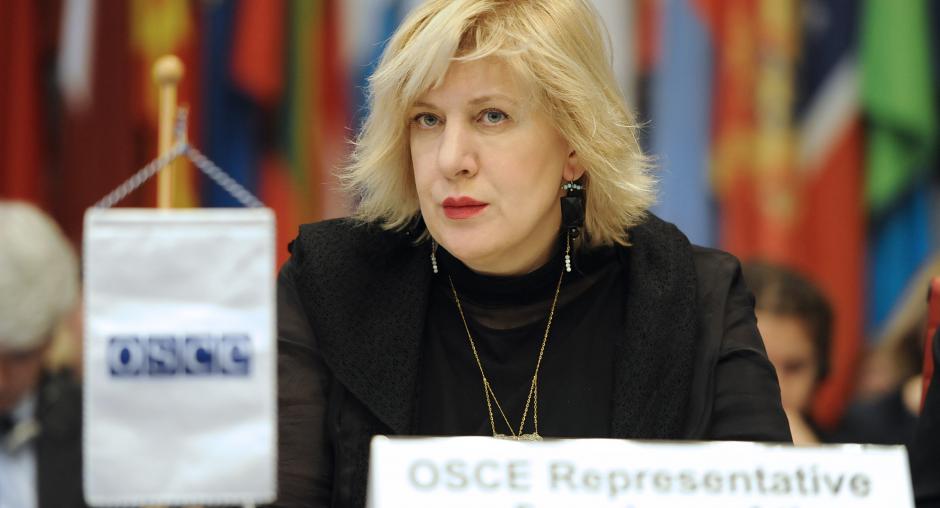OSCE representative mourns death of Russian journalist; denounces new cases of media freedom violations in Ukraine

VIENNA, 17 June 2014 – OSCE Representative on Freedom of the Media Dunja Mijatović today said she was deeply saddened by the death of Russian journalist Igor Kornelyuk in eastern Ukraine. Mijatović expressed her sincere condolences to Kornelyuk’s family and colleagues.
“This death is yet another horrid reminder that not enough is being done to protect journalists who risk their lives reporting from conflict zones in Ukraine,” Mijatović said.
Kornelyuk, a journalist with the Russian State Television and Radio Broadcasting Company, along with his two other colleagues was under mortar fire on 17 June near Luhansk where a crew was covering the conflict. According to reports, Kornelyuk was severely wounded and died the same day in a local hospital. Anton Voloshin, a sound engineer, is reported missing.
“I call on the authorities to swiftly and thoroughly investigate the circumstances of this deadly attack and to hold those responsible accountable,” Mijatović said.
Mijatović also expressed deep concern about the deteriorating media freedom environment in Ukraine.
“I am also worried about the harassment of journalists in the country, which has a negative effect on media professionals who strive to inform the public. I continue to call on all parties to let journalists do their job in a free and safe manner,” Mijatović said.
She said her Office would continue to monitor the situation and bring media-freedom violations to public light. The latest incidents include:
- On 14 June reporter Yevgeny Davydov and sound engineer Nikita Konashenkov with the Russian state TV channel Zvezda were detained by the Ukrainian military at a checkpoint near the village of Pokrovskoye in Dnipropetrovsk oblast and released yesterday. After their release they both claimed being beaten while in custody. This allegation should be thoroughly investigated by the authorities;
- On 6 June Andrey Sushenkov and Anton Malyshev, cameraman and sound engineer with the same channel, were detained by the Ukrainian military and released three days later;
- On 9 June representatives of the so-called ‘Donetsk People’s Republic’ demanded all local internet service providers to reveal user data, including e-mails, contact lists, login information, visiting history and other information or face seizure of equipment;
- On 8 June Evgen Serdyukov and his father Vasil Serdyukov, both with Serditaya Gazeta, were beaten by an armed group in Luhansk;
- On 6 June a crew from the Russian State Television and Radio Broadcasting Company, despite valid accreditation, was expelled from the Verkhovna Rada building and verbally abused by Oleg Lyashko, a member of the Verkhovna Rada who accused the journalists of espionage;
- On 6 June a group of unidentified individuals torched the editorial office of the Gornyak newspaper in Torez, Donetsk oblast;
- On 4 June Andrey Vlaschenko, a journalist with Novosti-N online newspaper in Mykolaiv was threatened by a group of individuals who seized his recording equipment and erased records;
- On 4 June Riza Veli and Ruslan Aliev, cameraman and technical director for the Crimean Tatar ATR channel, were denied entry by national border guards at the Melitopol checkpoint;
- On 4 June Ruslan Yugosh, a journalist with news portal Sobytiya Kryma in Crimea, reported that his mother had been summoned by police in an attempt to exert pressure on him;
- On June 3 several journalists in Mykolaiv were intimidated by protesters who tried to stop them from filming;
- On 3 June Anton Vodyanoi, a journalist with Insider online portal, was reportedly detained and beaten by Ukrainian military near Izyum town in Kharkiv oblast. He was released the next day;
- On June 2 the Simferopol Prosecutor’s Office issued a warning to Shevket Kaibullayev, chief editor of the Tatar newspaper Avdet, for distributing extremist materials, reportedly in reaction to the newspaper’s reports which were critical of current Crimean authorities.
In addition, Mijatović noted that media professionals in Crimea are still having problems getting accredited to attend official meetings. On 9 June journalists with the Centre for Journalistic Investigations in Simferopol were again denied accreditation for a meeting of the Council of Ministers of Crimea.
The OSCE Representative on Freedom of the Media observes media developments in all 57 OSCE participating States. She provides early warning on violations of freedom of expression and media freedom and promotes full compliance with OSCE media freedom commitments. Learn more at www.osce.org/fom, Twitter: @OSCE_RFoM and on facebook.com/osce.rfom.
